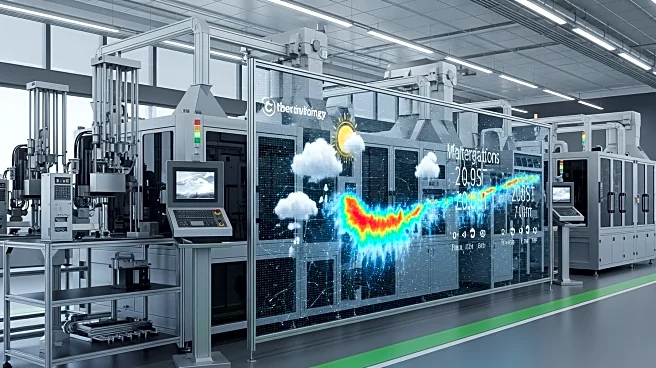What's Happening?
The University of Sheffield Advanced Manufacturing Research Centre (AMRC) has developed a system that leverages weather forecasts to optimize the scheduling of energy-intensive manufacturing tasks. This
approach aims to reduce the carbon footprint of manufacturing processes by aligning production schedules with periods of lower carbon intensity in the electricity grid. The system uses a machine learning model trained on historical weather data to predict energy carbon intensity over 48 hours, allowing manufacturers to make informed decisions about when to run machinery with the lowest associated CO2 emissions. The initiative builds on previous research under Project Butterfly, which established the link between weather patterns and energy carbon intensity.
Why It's Important?
This development is significant as it addresses the challenge of reducing carbon emissions in manufacturing, a sector traditionally reliant on fossil fuels. By strategically scheduling tasks during periods of lower carbon intensity, manufacturers can significantly lower their environmental impact without compromising productivity. This approach supports the UK's net zero goals and demonstrates a practical application of renewable energy integration in industrial processes. The research highlights the potential for substantial emissions reductions, as evidenced by simulations showing a decrease in CO2 emissions with minimal adjustments to production timelines.
What's Next?
Further research is needed to integrate this system into complex manufacturing environments and incorporate data from entire production facilities. The AMRC plans to refine the model and expand its application across various manufacturing processes. This could lead to widespread adoption of sustainable scheduling practices, encouraging other industries to consider similar approaches. The ongoing development of the web interface tool will aid manufacturers in understanding the trade-offs between production efficiency and environmental impact, potentially influencing industry standards and practices.
Beyond the Headlines
The ethical implications of this research are profound, as it offers a tangible method for industries to contribute to climate change mitigation. By prioritizing sustainable practices, manufacturers can play a crucial role in reducing global carbon emissions. This approach also highlights the importance of interdisciplinary collaboration, combining expertise in engineering, meteorology, and data science to address environmental challenges. The success of this initiative could inspire similar innovations in other sectors, promoting a broader shift towards sustainability.









